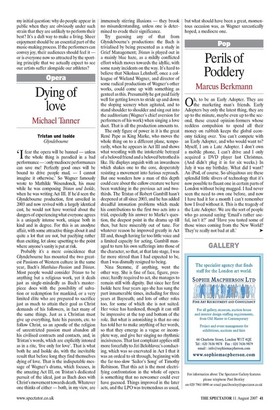Dying of love Michael Tanner Tristan und !snide Glyndeboume T
fear the opera will be banned — unless 1 the whole thing is parodied in a bad performance — : only mediocre performances can save me! Perfectly good ones will be bound to drive people mad, — I cannot imagine it otherwise.' So Wagner famously wrote to Mathilde Wesendonck, his muse while he was composing Tristan und Isolde, when he was writing Act III. If he'd seen the Glyndeboume production, first unveiled in 2003 and now revived with a largely identical cast, he would not have worried about the dangers of experiencing what everyone agrees is a uniquely intense work, unique both in kind and in degree. For this is an anodyne affair, with some attractive things about it and quite a lot that are not, but pacifying rather than exciting, let alone upsetting to the point where anyone's sanity is put at risk.
Probably it's a mere coincidence that Glyndebourne has mounted the two greatest Passions of Western culture in the same year, Bach's Matthaus-Passion and Tristan. Most people would consider Tristan to be anything but a religious work, yet it deals just as single-mindedly as Bach's masterpiece does with the possibility of salvation or redemption for mankind, or a very limited elite who are prepared to sacrifice just as much to attain their goal as Christ demands of his followers, in fact many of the same things. Just as a Christian must give up everything, hate his parents, etc. to follow Christ, so an apostle of the religion of unrestricted passion must abandon all his civilised contracts and contacts, and, in Tristan's words, which are explicitly intoned as in a rite, 'live only for love'. That is what both he and Isolde do, with the inevitable result that before long they find themselves dying of love. That is the indisputable message of Wagner's drama, which focuses, in the amazing Act III, on Tristan's dedicated pursuit of the ideal, just as Bach does with Christ's movement towards death. Whatever one thinks of either — both, in my view, are immensely stirring illusions — they brook no misunderstanding, unless one is determined to evade their significance.
Try guessing any of that from Glyndebourne's productions: the Bach is trivialised by being presented as a study in Grief Management; Tristan is played out in a mainly blue haze, as a mildly conflicted effort which moves towards the idyllic, with some nasty incidents on the way. It's hard to believe that Nikolaus Lehnhoff, once a colleague of Wieland Wagner, and director of some radical productions of Wagner's other works, could come up with something as genteel as this. Presumably he got paid fairly well for getting lovers to stride up and down the sloping scenery when agitated, and to stand shoulder to shoulder and sing out into the auditorium (Wagner's chief aversion for performers of his work) when singing a love duet. That is all the production amounts to.
The only figure of power in it is the great Rene Pape as King Marke, who moves the whole thing on to a different plane, temporarily, when he appears in Act III and shows what wrestling with the intolerable betrayal of a beloved friend and a beloved betrothed is like. He displays anguish with an inwardness which shakes one to the core, desperately resisting a movement into furious reproach. But one wonders how a man of this depth could care about the callow creature we have been watching in the previous act and twothirds. The Tristan of Robert Gambill hasn't deepened at all since 2003, and he has added dreadful intonation problems which made his contributions to the first two acts into a trial, especially his answer to Marke's question, the deepest point in the drama up till then, but here miserably out of tune. For whatever reason he improved greatly in Act III and, though having far too little voice and a limited capacity for acting, Gambill managed to turn his own sufferings into those of the character, so that, at that late stage, I was far more stirred than I had expected to be, than I was dismally resigned to being.
Nina Stemme, if anything, went the other way. She is fine of face, figure, presence; hardly required to act, she manages to remain still with dignity. But since her first Isolde here four years ago she has sung the part innumerable times, including for three years at Bayreuth; and lots of other roles too, for some of which she is not suited. Her voice has hardened, though it can still be impressive at the top and bottom of the role. But what is astonishing is that no one has told her to make anything of her words, so that they emerge in a vague or incomplete way, and give her singing no rhythmic incisiveness. That last complaint applies still more forcefully to Jiri Belohlavec's conducting, which was so enervated in Act I that it was an ordeal to sit through, beginning with the far-too-slow 'Sailor's Song' of Timothy Robinson. That this act is the most electrifying confrontation in the whole of opera is something that no newcomer could ever have guessed. Things improved in the later acts, and the LPO was tremendous as usual, but what should have been a great, momentous occasion was, as Wagner sarcastically hoped, a mediocre one.









































 Previous page
Previous page